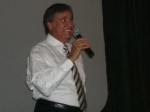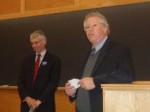Mills: ‘Dignity, beauty, and hope’

He was standing on a chair in front of an open window rocking back and forth thinking ‘just let go.’ Somehow he found the strength to step down and search for incentive to go on.
Until the urge to kill himself passed, Billy Mills kept writing ‘Gold medal, 10,000 meter run, believe, believe, believe.’
Mills almost let other people’s perceptions defeat him that day, but he held on and became the 1964 Olympic gold medalist in the 10,000 meter run.
Overcoming hardships seems to be what Mills spent much of his life doing and during his keynote speech in Glenbrook Gymnasium on Nov. 7, he told a large audience what he had conquered and the perceptions he has defeated.
Being half Sioux Indian and half Caucasian, Mills never felt he belonged on Pine Ridge Reservation in North Dakota where he was born, or off it, in the white world.
‘You, the dark skinned one, we want you out of the picture,’ Mills recalled of the three times in his younger years being asked to step out of photographs with white athletes and being spit on and called ‘prairie nigger.’
Mills had many stabs to his pride and motivation while in pursuit of his dreams. He was orphaned by age 12, living in one of the poorest communities in America, sleeping in an abandoned car while working because there were no jobs on the reservation. And then there was his college track coach, who constantly told him his desire to be an Olympian was not practical.
Mills triumphed and became an Olympian, but there were more motivational barriers to overcome.
On the bus to the Olympics, he sat with a Polish woman who asked what he was competing in. Mills told her the 10,000 meter run and she asks ‘who do you think is going to win?’ He said nothing and then the woman gave him a choice between two big name runners, a choice that did not include him. Having difficulty pushing the words off his tongue, he said “I’m going to win.” The woman then asked ‘who are you?’
Those same words were asked of him from a Japanese man right after winning the gold medal.
The lack of respect continued when with an athlete still on the track and the next event soon to start, Mills was not allowed to run the customary victory lap. In 1984 when the film ‘Running Brave’ was released, he went back to Tokyo to run his long awaited lap. While jogging, after recent knee surgery, Mills said he could hear the crowd.
He paused, pulling his wife Pat’s ticket stub from his pocket, and looked up at where she sat at the games.
He said he’s thankful he borrowed the $1,000 for her to be there 20 years earlier, after questioning if he really needed her there. Half-way through the race he almost gave up, then he saw her in the crowd cheering, which was enough motivation to keep going.
As he jogged across the finish line, he realized the stadium was empty with the exception of his clapping wife.
Being Sports Illustrated Athlete of the Century for South Dakota and his with his 10,000 meter win being considered one of the biggest Olympic upsets, Mills became part of history. However, not everyone remembered him so fondly.
At the 1992 Olympics in Barcelona, Spain, while continuing the family tradition of attending the Olympics, Mills overheard some men talking. They spoke of 1964 when ‘that Indian guy’ won as the best race in history. One man asked ‘I wonder what happened to that guy?’ and another responded ‘I know what happened to him, he’s a quitter, an alcoholic.’
Mills, hurt, said nothing, while his daughter begged him to stand up to them. Mills then remembered his father telling him as a child he had broken wings and turned to the men and said, “Excuse me sir are you talking about Billy Mills?”
He told them that by choice he never took drugs or drank and has raised millions of dollars for charities world wide. As the men were apologizing, Mills’ daughter turned to him and said, ‘You always find the strength to have wings of an eagle.’
Overwhelmed with the echo of his fathers words from his daughter’s lips, he left the stadium for a moment to cry.
Mills now uses his stories of suffering and triumph to inspire others to become warriors.
“Find that warrior within you and bring it out,” he said before playing a video for the “emerging elite of warriors in the audience,” with athletes in history overcoming hardships and ending with the Jesse Owens quote ‘Everybody should have a dream.’
Mills lived his dream, now he raises millions of dollars for charities to help youth find their dreams, self-empowerment, bravery, fortitude and generosity. He helps them to use the “virtue of wisdom to make the right choices.”
He lives and encourages his father’s words, “Every dream has a passion, every passion has a destiny.






